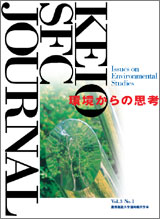- HOME
- KEIO SFC JOURNAL
- Vol.4 No.1

-
A Longitudinal Study of Stress and Burnout among Employees of an Elderly Care Institution − A case study at a group home for dementia people
Emiko Ban Doctoral Program, Graduate School of Media and Governance, Keio University The purpose of this study is to explore the longitudinal change of stressors and burnout experienced by workers of group home for dementia people. Using questionnaires, approximately 40 workers at a group home were surveyed every three month for 5 times. The organizational restructuring occurred between the third and forth survey. The stressors which were experienced most frequently throughout the research period were 'work overload'. And the stressors which showed significant relation with burnout were 'role ambiguity' and 'role conflict'. After the restructuring, the degree of burnout was significantly higher and the experienced stressors 'excessive demand' were significantly increased.
Download this article (PDF): SFCJ4-01.pdf -
Information Distribution and Management of Small Communities for Homecare
Eiko Uchiyama Assistant Professor (Non-Tenured), Graduate School of Media and Governance, Keio University Shoko Miyagawa Associate Professor, Faculty of Nursing and Medical Care, Keio University This research focuses on the fact that information sharing in in-house care is often insufficient. After analysis of the factors obstructing information sharing, we proposed a new communication model and evaluated it. The proposed model simultaneously allows for horizontal communications required for transparent information sharing and hierarchical access control by the service users which is imperative for sharing of privacy information. A system was developed to actualize this model and evaluated for validity. As a result it was proven that better information sharing in in-house care led to improved care service and a higher degree of satisfaction from the users.
Download this article (PDF): SFCJ4-02.pdf -
Governmental Internet Control and Islam − A Thought on Internet Control in the Middle East
Tatsuya Yamamoto Senior Visiting Researcher, Keio Research Institute at SFC Director, Japan Center for Academic Cooperation, University of Aleppo Internet control, which is carried out in the Middle Eastern Arabic countries, is criticized by some international NGO's and governments. Regarding to this matter, the Middle Eastern governments bring forward a counterargument against international criticism such as "we just cut off anti-Islamic contents in the Internet in order to protect Islamic values". However, it will be cleared that the Middle Eastern government's argument has less Islamic appropriateness when we examine this matter with Islamic point of view. Although the government's claim has less appropriateness, a political use of Islam is still effective because of the controlling policy by current authoritarian regimes.
Download this article (PDF):SFCJ4-03.pdf -
Considerations on the Deliberative Opinion Poll as the Institution for Consensus-Building
Noboru Yanase Assistant Professor, School of General Education, Shinshu University Part-time Lecturer, Faculty of Policy Management, Keio University Deliberative Opinion Poll produced by James Fishkin, political scientist, now attracts well-known constitutional scholars' notices such as Cass Sunstein, Bruce Ackerman, Lawrence Lessig and so on. This particular opinion poll is the contact point between the political theories of deliberative democracy and legal ones that seem to set off on their own paths. This paper introduces a schema and previous practices of the deliberative opinion poll and consists on the significance of it as the institution for consensus-building from the aspects of participation, deliberation, strength of interest, expertise and representativeness.
Download this article (PDF): SFCJ4-04.pdf -
Concept Development of the Electric Vehicle "KAZ"
Dirk van Gogh Fine Arts and Audiovisual Art, Department of Architecture, Hogeschool Gent, Ghent University Association Kiyomoto Kawakami Research Associate (Non-Tenured), Graduate School of Media and Governance, Keio University Kikuo Emoto Assistant Professor (Non-Tenured), Graduate School of Media and Governance, Keio University Hiroshi Shimizu Professor, Faculty of Environmental Information, Keio University Actually an internal combustion engine vehicle's structure is different of that of an electric vehicle. To enter electric vehicles into the automotive market, environmental and energy problems are solved but a high performance with new merits need be originated. In this paper EV technology and the target user are analyzed. New wheel lay-out, door and seat arrangements and the outer and inner styling are originated. Using this research a high class vehicle is created, clay models, a running prototype and real models are realized. The cabin space is 1.5 times larger than that of the same outer sized internal combustion engine car. Finally a 600hp and high speed electric vehicle of 311km/h, a 1/2 box vehicle appeared on today's road.
PD
-
Privacy Management in Information Delivery Using Social Network Structures
Yoshihiko Suko Doctoral Program, Graduate School of Media and Governance, Keio University The purpose of this research is proposing the human resource matching model which reduces the risk about information disclosure of a user utilizing the acquaintance relation between users. In this research, I propose the matching model which reduces the risks of the information disclosure through 1) modeling the acquaintance relation, which is the resources on the actual world, into the communication tool and 2) offering new options which are able to choose for users in information disclosure. Moreover, the proposal model is implemented as a communication tool which users can use generally in respect of cost and scalability and the validity and the subject of the model are drawn thorough practical use.
Download this article (PDF):SFCJ4-06.pdf -
Organizational Facilitators in the COPs
Emi Hotta Humanvalue, Inc. Tetsuhito Sakata Senior Visiting Researcher, Keio Research Institute at SFC Due to the change in the business environment, groups or team based organizations are increasing. It is important for firms to make an organization that can make use of groups and teams more effectively. Communities of Practice is noticed as groups and teams found in organizations. COPs are a form that evolves through dynamic and systematic human networking. In order to make use of COPs it is important for organizations to capture the dynamic change of COPs from two aspects: the dynamism of networks and the evolution within organizations. In this study, we will focus on the dynamice change of "Communities of Practice" and how organizations can support their activities to gain more from them. Through this study, we aim to propose a method of making the best of COPs or similar teams and groups.
-
IT Environment for Behavior Change of Corporate Employees
Tomoyuki Suzuki MI Associates Corporation To increase employees' creativity, companies' attitude for IT was just installing tool like groupware so far. However, this paper will consider the relation between learning theories and IT infrastructure, and clarify the potential about situated learning with IT (simulation-based e-learning and communities of practice). Now, many companies cannot catch the potential, so this paper will think about the issues and solutions.

